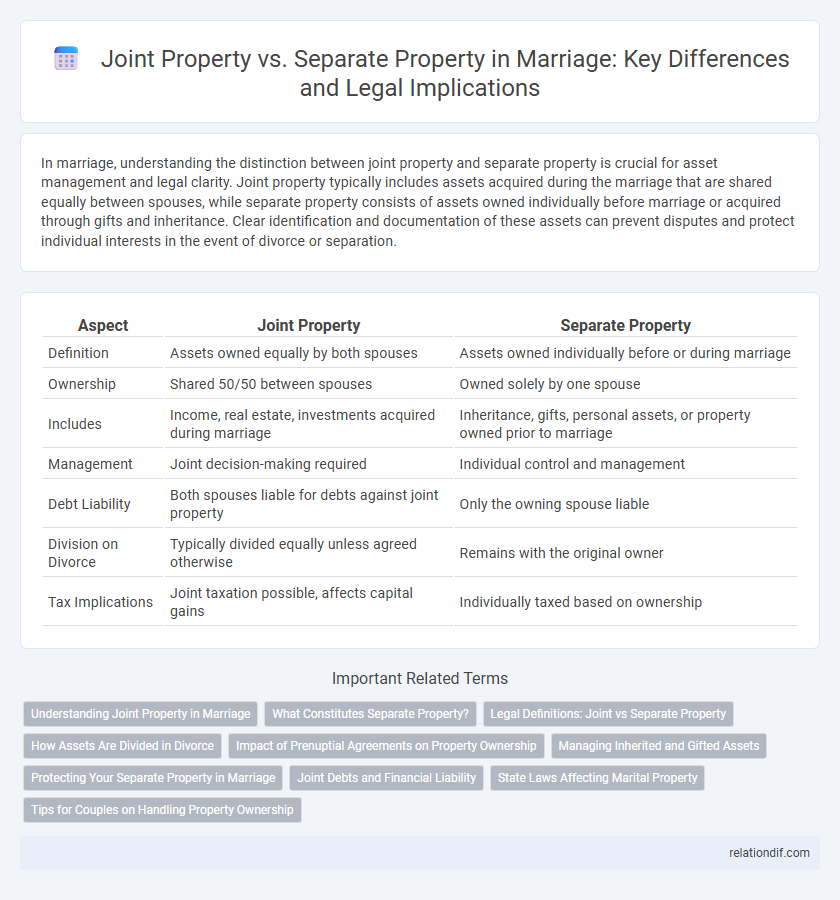In marriage, understanding the distinction between joint property and separate property is crucial for asset management and legal clarity. Joint property typically includes assets acquired during the marriage that are shared equally between spouses, while separate property consists of assets owned individually before marriage or acquired through gifts and inheritance. Clear identification and documentation of these assets can prevent disputes and protect individual interests in the event of divorce or separation.
Table of Comparison
| Aspect | Joint Property | Separate Property |
|---|---|---|
| Definition | Assets owned equally by both spouses | Assets owned individually before or during marriage |
| Ownership | Shared 50/50 between spouses | Owned solely by one spouse |
| Includes | Income, real estate, investments acquired during marriage | Inheritance, gifts, personal assets, or property owned prior to marriage |
| Management | Joint decision-making required | Individual control and management |
| Debt Liability | Both spouses liable for debts against joint property | Only the owning spouse liable |
| Division on Divorce | Typically divided equally unless agreed otherwise | Remains with the original owner |
| Tax Implications | Joint taxation possible, affects capital gains | Individually taxed based on ownership |
Understanding Joint Property in Marriage
Joint property in marriage refers to assets and debts acquired by spouses during the marriage that are legally recognized as owned together, regardless of whose name appears on the title. This typically includes income, real estate, and investments accumulated while married, emphasizing shared financial responsibility and rights. Understanding the legal framework governing joint property is crucial for navigating asset division and protecting both parties' interests in the event of separation or divorce.
What Constitutes Separate Property?
Separate property includes assets owned by one spouse before marriage, inheritances, gifts received individually during the marriage, and property designated as separate by a valid prenuptial or postnuptial agreement. It also encompasses income derived solely from separate property, provided it has not been commingled with marital assets. Courts typically differentiate separate property by tracing its origin and confirming its clear separation from joint marital finances.
Legal Definitions: Joint vs Separate Property
Joint property refers to assets legally owned by both spouses, typically acquired during the marriage, and includes joint bank accounts, real estate, and investments. Separate property consists of assets owned individually by one spouse, such as those acquired before marriage, inheritances, or gifts, which remain under that spouse's sole ownership. Legal distinctions between joint and separate property impact division during divorce and inheritance rights, governed by state-specific marital property laws.
How Assets Are Divided in Divorce
In divorce proceedings, joint property typically includes assets acquired during the marriage and is subject to equitable distribution between spouses. Separate property, such as assets owned prior to marriage or received as individual gifts or inheritances, generally remains with the original owner. Courts assess factors like state laws, contributions to the marriage, and the duration of the relationship to determine the division of marital property.
Impact of Prenuptial Agreements on Property Ownership
Prenuptial agreements significantly influence property ownership by clearly defining joint property and separate property before marriage. These legal contracts protect individual assets, prevent disputes, and ensure that property acquired separately remains under personal ownership. Courts often uphold prenuptial agreements, which streamline asset division during divorce, providing clarity and financial security for both spouses.
Managing Inherited and Gifted Assets
Managing inherited and gifted assets within marriage requires clear differentiation between joint property and separate property to protect individual ownership rights. Inherited and gifted assets are typically considered separate property, remaining solely in the possession of the recipient spouse unless commingled with joint assets. Proper documentation and financial planning ensure these assets retain their separate status, safeguarding them from division during divorce or creditor claims.
Protecting Your Separate Property in Marriage
Protecting your separate property in marriage involves clearly distinguishing assets acquired before marriage or through inheritance from joint property accumulated during the marriage. Establishing prenuptial agreements, maintaining separate financial accounts, and documenting property ownership can safeguard individual assets from division in divorce. Understanding state-specific laws on marital property rights is crucial to effectively preserving separate property within a marriage.
Joint Debts and Financial Liability
Joint property typically involves shared ownership of assets and debts, meaning both spouses are equally responsible for joint debts incurred during the marriage. Separate property remains individually owned, and spouses are generally not liable for each other's separate debts unless jointly authorized. Understanding the distinction is crucial for managing financial liability and protecting individual credit during and after marriage.
State Laws Affecting Marital Property
State laws play a crucial role in determining whether marital property is classified as joint property or separate property during a marriage. Community property states generally consider most assets acquired during the marriage as joint property, while equitable distribution states divide assets fairly but not necessarily equally. Understanding these state-specific regulations is essential for spouses to manage ownership rights and resolve property disputes effectively.
Tips for Couples on Handling Property Ownership
Couples should clearly define joint property and separate property early in their marriage to avoid disputes and ensure transparency. Maintaining detailed records of acquisitions and contributions helps protect individual rights in case of separation or inheritance issues. Legal agreements such as prenuptial or postnuptial contracts provide clarity on property ownership and can safeguard assets for both partners.
Joint Property vs Separate Property Infographic

 relationdif.com
relationdif.com